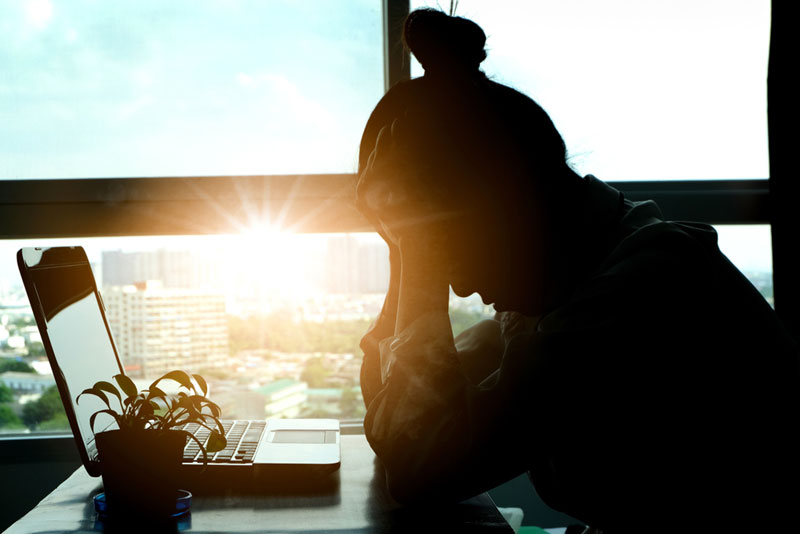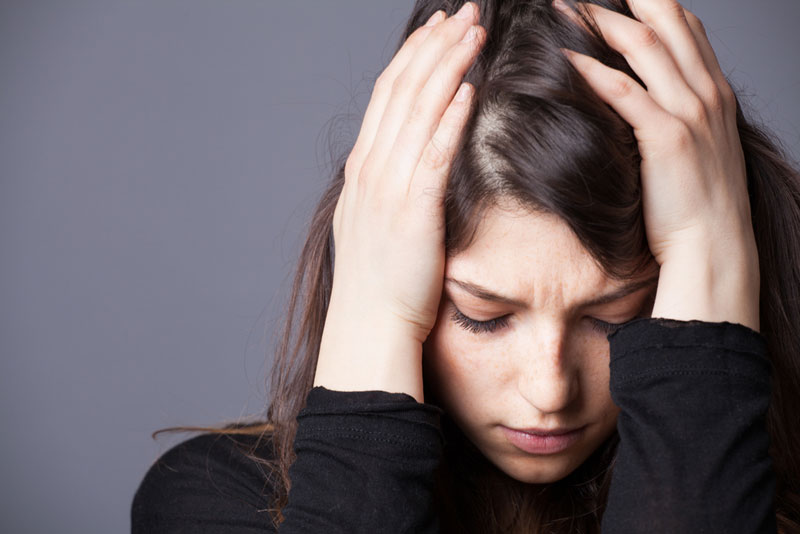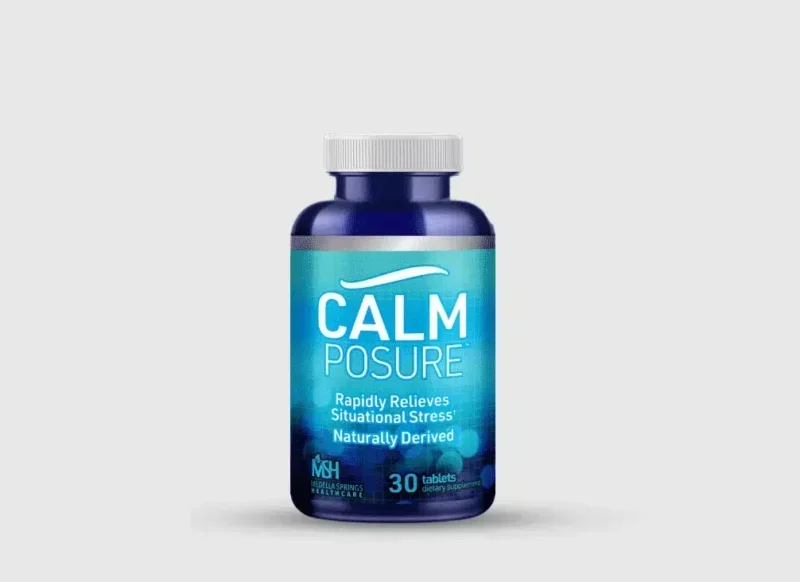Anxiety is a common experience on a very long spectrum. If you’ve ever felt anxious, you know how horrible it can be. It can also feel debilitating and all-consuming, fighting every logical thought you know exists. For many, it is a frightening experience.
Unfortunately, as with many other mental health issues, there is a lot of misinformation about anxiety permeating the internet and the world. Knowing what’s real and what’s not is important if you’re trying to manage your stress. Here are 5 myths about anxiety that everyone believes but aren’t true.
Medella Springs’s Anxiety Supplement
Calmposure is a naturally derived solution that has not reported any side effects in clinical trials. It is designed to rapidly soothe feelings of anxiety induced by stress by blocking stress hormone receptors, helping to restore a sense of calm and control.
Who Suffer The Anxiety More Men Or Women?
Anxiety disorders can affect anyone, but research shows that they are more common in women than in men. Factors contributing to this discrepancy may include biological differences, societal expectations, and varying stressors in life experiences. Additionally, individuals with a history of trauma or those facing significant life stressors are also at a higher risk of developing anxiety disorders. It’s important to note, however, that anxiety is a highly individual experience, and its prevalence can vary widely depending on various demographic and personal factors.
Causes Of Anxiety

Well-identified factors can cause anxiety states, including:
- A stressful situation with physical or psychological exhaustion, for example, chronic stress at work;
- An illness or death in the family or the circle of friends;
- A precarious professional situation;
- A new stage in life (such as retirement, divorce, or the departure of a child from home);
- The hormonal balance changes of menopause;
- A negative experience (a physical attack, Left arm pain)
- Psychological conditions such as depression or schizophrenia.
5 Popular Myths About Anxiety Disorder

Myths about anxiety can be harmful because they often prevent people from seeking treatment. If you think your condition is not serious, you may ignore the problem until it becomes debilitating. So, let’s stop spreading misinformation, fight the stigma, and explore some popular myths and facts about anxiety.
Myth 1: Everyone Suffers From Anxiety
One of the most popular myths about anxiety is that it affects the entire population.
Although everyone experiences worry daily, not everyone meets the diagnostic criteria for what is called generalized anxiety disorder (GAD). A person with GAD may suffer from a constant feeling of dread and a reduced ability to function. Anxiety disorder is more than worrying thoughts; it can even affect a person’s body. People with anxiety report physical symptoms such as:
- Feel dizzy
- Dizziness
- Stomach cramps
- Sweat
- Hot flashes
- Fast, irregular heartbeat
- Low testosterone
- Shortness of breath
Myth No. 2: Anxiety Has No Effects On Physical Health
Anxiety is often thought to be a mental condition that only affects the mind, but it has physical effects on the body. Here are some examples:
- Breathing
Those with anxiety may often experience shortness of breath. Those who also have breathing disorders, such as chronic obstructive pulmonary disease and anxiety-related complications, may worsen their risk of being hospitalized. Anxiety can also make asthma symptoms worse.
- Immunity
When you experience anxiety, your body responds through a fight-or-flight instinct. This increases the body’s pulse and respiration to provide the necessary components to survive a situation at the expense of other basic body functions. This is good when you need it but bad when it’s chronic, as a constant fight-or-flight scenario compromises your immunity.
- Cardiovascular problems
Constant anxiety increases the risk of high blood pressure, palpitations, chest pain, and other cardiovascular problems. It certainly doesn’t help that it’s easy to confuse panic attacks with heart attacks, either.
- Digestion
You may have noticed that your stomach feels nauseous under severe stress. Anxiety disorders commonly affect the Digestive system, causing problems with defecation, stomach pain, changes in appetite, and even nausea. For some, digestive disorders can also be a risk factor for diseases such as irritable bowel syndrome.
Myth No.3: If You Have Anxiety, You Had An Unhappy Childhood
Not all people who suffer from anxiety have experienced trauma. Or rather, there is not necessarily a specific cause that justifies the onset of this disorder. Our reaction to life events is very subjective. Many different factors influence it:
Biological
Environmental
And family.
Our way of expressing, decoding, and managing emotions in high stress is part of our experience and our deeper way of being. For this reason, there does not necessarily have to have been an “unhappy childhood” to justify the attacks.
Myth No.4: Medication Is The Only Way To Treat Anxiety
It is common to be prescribed antidepressants to deal with anxiety. The pharmacological route may sometimes be necessary to help a person feel well enough to explore other treatment options and begin working on stress reduction. However, meditation for anxiety is not the only way to treat anxiety disorders.
Antidepressants are commonly prescribed for anxiety, but cognitive behavioral therapy can be just as effective without side effects. Relaxation techniques and online therapy can also help manage stress. Self-help strategies like self-care and journaling can boost self-esteem.
Myth No. 5: Anxiety Is The Same Thing As Shyness
Anxiety is often considered synonymous with shyness. Although the symptoms may appear similar, one is a mental health condition while the other is a personality characteristic.
Shy people lack self-confidence and have difficulty with social interactions but do not necessarily experience worry at the same level of intensity as people with SAD. A timid person may feel awkward and nervous at a party. In contrast, a person who suffers from an anxiety disorder is likely to experience debilitating symptoms such as shortness of breath, sweaty palms, and dizziness.
Final Thoughts
There’s a lot about anxiety disorder and other mental health issues that we still don’t know, and accepting myths about anxiety certainly doesn’t help matters. If you are seeking help or learning about anxiety to help someone in your life, ensure the information you absorb is accurate!
Frequently Asked Questions
Do Only Weak People Suffer From Anxiety?
Not. Anxiety can affect any one of you, regardless of your strength, character, or accomplishments. It is a widespread condition that does not discriminate by personality type. Labeling people with anxiety as “weak” is a harmful myth that perpetuates stigma.
Will Anxiety Go Away If You Ignore It?
Ignoring anxiety often does not make it go away and can sometimes exacerbate it. Acknowledging anxiety and seeking appropriate treatment is crucial for anxiety symptoms and improving quality of life.

